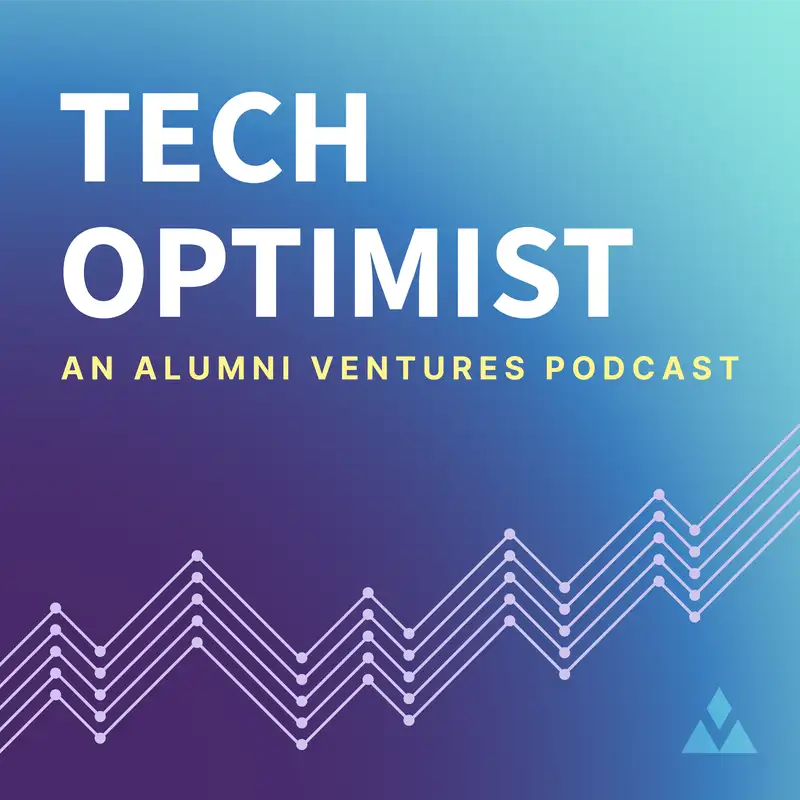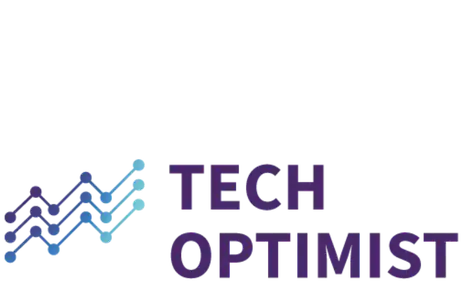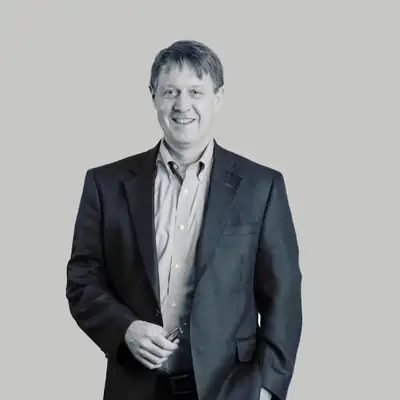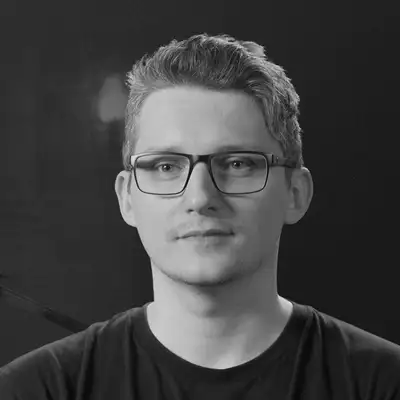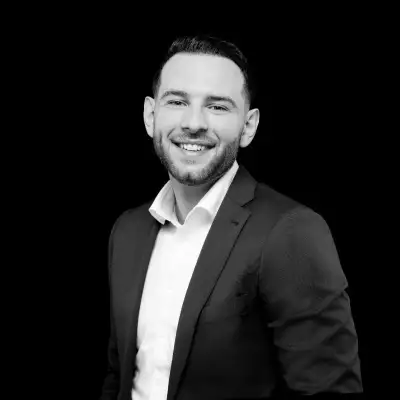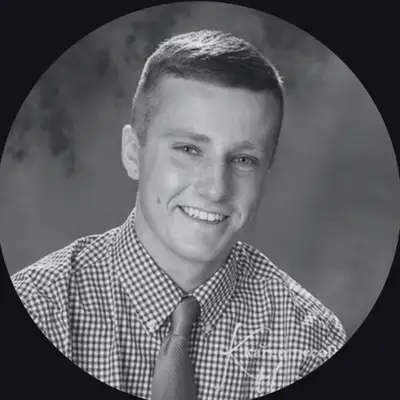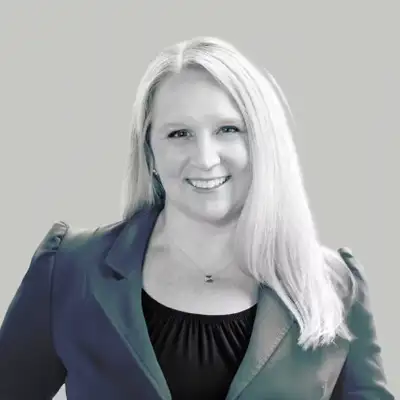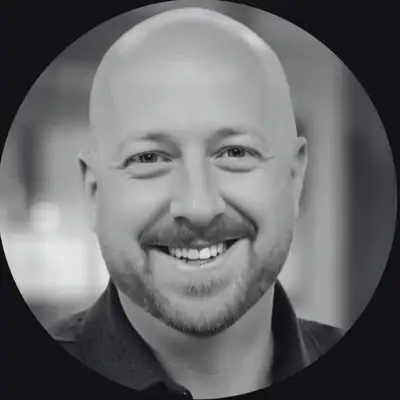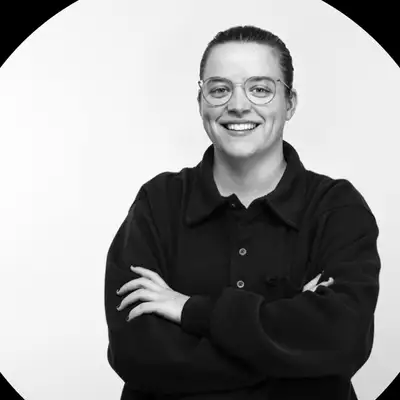#36 - Mastering VR Combat: The Future of Gaming with Sinn Studios
Sam Herrick:
Do you ever wish you could fight some medieval gladiators? Well, now you can. This gaming studio has made it possible with VR.
Almir Brljak:
I actually saw the CEO of Coinbase say this once where he's like, "The best thing to do when you don't know what to do is to do anything, because then you'll have information as to what to do next."
Alek Sinn:
At the time, in entertainment at least, we couldn't imagine back then just how powerful it was going to be in other mediums.
Mike Collins:
Going all in on this particular vision, if you can wait to make that decision, don't raise, don't raise, don't raise until you know have something.
Sam Herrick:
Welcome back to this episode of The Tech Optimist: Meet the Startup. Today we meet Sinn Studio. Of course, we will be guided through this interview by Mike Collins, Founder and CEO at Alumni Ventures. Our first guest will be Almir Brljak, a co-founder and COO of the company. And then Alek Sinn, who is a CEO and Creative Director of Sinn Studio. And of course myself, Sam Herrick, your tech note writer and guide for this show. Let's go.
In a world captivated by criticism, it's easy to overlook the groundbreaking technologies shaping our future. Let's shine a light on innovators who are propelling us forward. As the most active venture capital firm in the US, we have an exceptional view of tech's real world impact. Join us as we explore, celebrate, and contribute to the stories of those creating tomorrow. Welcome to The Tech Optimist. As a reminder, The Tech Optimist Podcast is for the informational purposes only. It is not personalized advice and it is not an offer to buy or sell securities. For additional important details, please see the text description accompanying this episode.
Mike Collins:
Right, Al, do you want to ask me a question before we get started?
Almir Brljak:
Yeah. What is your thought on spatial computing on a very high level?
Mike Collins:
On spatial computing?
Almir Brljak:
Mm-hm.
Mike Collins:
I think it is inevitable. I think that's a question of timing. I'm an Apple guy, so I'm of the era where I got my first Macintosh in 1983. I can remember it to this day in my dorm room at Dartmouth, and we opened it up and it had MacPaint. But I'm of the era where you had to write papers with typewriters and correct type, and it was magic to us. And I've been kind of a Macintosh person. That was a very influential imprinting they did. Very smart to get to college students with things early. I know how many of my classmates are now running huge companies that are Mac shops because Apple had the foresight in the eighties to kind of go after colleges and universities.
Sam Herrick:
Picture this, it's a Sunday and about the year 1984, probably around 6:00 or 7:00 p.m. It's a Sunday and it happens to be Super Bowl Sunday. Super Bowl 13, the 1984 Super Bowl, was between the Las Vegas Raiders and the Washington Redskins. Now, why I'm bringing this up is because in the third quarter there was an Apple commercial that played once and only once ever. This is the only time it was ever aired, and it is a 1984 Apple Computer Macintosh commercial directed by Ridley Scott. And the spot provided the allegory of the new Apple Macintosh computer, providing an inspirational creative spark that would free individuals from the overbearing control of Big Brother, presumably IBM's personal computer. So I found it, I think it's a really fun little commercial. It's about 60 seconds long, and so here it is. I felt like adding this little piece of context, it sort of helped us all get into the mindset that Mike is talking about here in the glory days of the eighties when the first Macintosh computer came out. So let's get into that mindset.
Apple:
The day we celebrate the first glorious anniversary of the information purification [inaudible 00:04:49]. We have created, for the first time in all history, a garden of pure ideology where each worker may bloom, secure from the pests obeying contradictory laws. Our unification as always is more powerful a weapon than any fleet or army on earth. We are one people with one will, one resolve, one cause. Our enemies shall talk themselves to death, but we will bury them with their own confusion. We shall prevail.
On January 24th, Apple Computer will introduce Macintosh and you'll see why 1984 won't be like 1984.
Mike Collins:
So yeah, I got the Vision Pro. I use it mostly for end of day unwinding. It's like I tune out, I put in the background, and I'm at a mountain thing, and I'm just listening to music or watching a movie or something like that. For me, it's like just dipping my toe, getting comfortable with wearing a headset. I'm not bold enough to wear it on an airplane or on the subway or things. I would say I think it is inevitable. I think we're going to see things too, not just in entertainment. I think we're going to see things in training. I think we're going to see the combination of it in robotics, so I can have a human kind of managing. We're seeing this in warfare with drones-
Almir Brljak:
Oh yeah.
Mike Collins:
... clearly going on. I think we're going to see it in healthcare where I can have a really good surgeon and a machine on the other end and all of a sudden I don't need to fly to the Mayo Clinic to have my surgery done. So I think it's inevitable. Like a lot of technologies, things have to work, including human's ability to deal with new and change is often the limiting factor. It's like there are so many things where it's like, why aren't you... I was at family gatherings and it's like, why aren't you solving that problem by watching a YouTube video? Or why aren't you asking ChatGPT-4 to outline for you how you should be preparing your teaching assignments? That would just be better.
Humans, I think can only process so much change, and so just the 30 year trajectory I've had is always... One of the tricks of being an entrepreneur is, how do you create the bridges from what the technology can do to what humans can handle? And there have been so many cases I've seen where people have been early to the market, and one of the things that great entrepreneurs do is just... It's not like what should be, but what is. And what can I offer that can kind of bridge them to the first step? And then you take the first step and that gets them to the second step. It's that kind of scaffolding. I don't know. Long-winded answer.
Almir Brljak:
No, no. No, that's great. And I actually saw the CEO of Coinbase say this once where he's like, "The best thing to do when you don't know what to do is to do anything, because then you'll have information as to what to do next."
Mike Collins:
Exactly. I think that's a great answer.
Sam Herrick:
That initially wasn't part of the original interview, but I listened to it, it was right before they hopped into the tech office interview, and I felt it was beneficial to keep in the episode. Because I think there are a lot of good points brought up there, and it's fascinating to see Mike's opinion and point on what Almir asked. So we're going to hop into a quick break and then we're going to go dive right into the interview.
Matt Caspari:
Hey everyone, just taking a quick break so I can tell you about the Deep Tech Fund from Alumni Ventures. AV is one of the only VC firms focused on making venture capital accessible to individual investors like you. In fact, AV is one of the most active and best performing VCs in the US, and we co-invest alongside renowned lead investors. With our Deep Tech Fund, you'll have the opportunity to invest in innovative solutions to major technical and scientific challenges, which can have a hugely positive effect on society: Companies that have the potential to redefine industries and create a more sustainable future and deliver significant financial returns. So if you're interested, visit us at av.vc/funds/deeptech. Now back to the show.
Mike Collins:
Welcome to The Tech Optimist Podcast. We're meeting another AV portfolio company today, Sinn Studio, and Almir and Alek, our co-founders of this exciting new technology. And a great privilege to talk to you today about the work you're doing, and so could you guys just give us a brief introduction to the company and what you guys are working on?
Alek Sinn:
Yeah. Almir, I'll let you get started. We could do a couple light intros on our-
Almir Brljak:
Sure. Cool. Well, thanks for having us, Mike. Excited to be here. Sinn Studio is a spatial computing entertainment company and an award-winning and bestseller on Meta, PlayStation and ByteDance platforms. We focus entirely on combat, as our belief is that where the body acts as the input to the experience, you get the most immersive type of experience. And then as a Founder, I operate as a COO. I look over operations, marketing, business development, and most recently helping on the producing side. In the past I've collaborated with Meta, ByteDance and PlayStation to develop go-to-market practices for developers. Because what we found out early on in XR is developers can amazing experiences, but they have really tough times monetizing them. And we need to solve that problem if we're going to see this industry really thrive.
Mike Collins:
Talk to us about just the kind of state of the industry with spatial computing. Again, I think a lot of us are familiar with the promise of it, and I think a lot of us have huge beliefs in the inevitability of the technology. Where are we? What state of play today? And again, you guys are really well positioned for the growth of this industry, but what do you think is the state of play in the drivers behind spatial computing?
Almir Brljak:
Yeah, I think that's a question we get continuously asked, and I think we're more optimistic than ever and it's because of two things. One is we know that headsets can sell. The Quest line is over 30 million units sold. Just the Quest line, the Meta Quest line on its own, not accounting for any other platforms. And another strong indication metric is that retention amongst the 9 to 16 audience is extremely high, three times the retention of adults. And that age group, the engagement rivals what you see on console. So the perspective is like, we know we can sell this. We've proven that, but now we have the future generations that have committed to this deeply. And I think moving forward, that's where we're going to see the mass adoption of spatial computing.
Mike Collins:
Great. Alek, turning to you a little bit, talk to me a little bit about having such a strong partnership here with two co-founders. How has that worked? What's really the beauty of that? We see so many of our successful teams really have a partnership, so talk to me a little bit about your partnership with Almir.
Alek Sinn:
Yeah, so we met when we were in grade seven, actually. We've been childhood friends ever since. And in 2017 we were hanging out one day with another one of our friends, and this was around the time VR started to become a thing. We got to talking and one thing led to another and we decided to pursue this because we really believed it was very obvious in the moment that VR was going to be a big part of the future. At the time, in entertainment at least, we couldn't imagine back then just how powerful it was going to be in other mediums. But I think the thing that makes this work as well as it does, and I know typically people say don't start companies with your friends, but in our case, fully transparent, Almir feels like family to me.
In terms of characteristics, we differ in just the right ways to really empower each other. He's very business minded, he's run companies in the past, very analytical. He will not take something from you unless you can back it up on the spot. He really needs to understand problems, whereas I come more from a creative background. I went to film school, I did a lot of VFX and animation. A lot more abstract, subjective things. And so when we started building games, I spent a lot of time thinking about VR and what made the games work. And he spent a lot of time thinking about what players wanted and how he could sell to them. And ultimately, I think there was a lot of overspill. He made me a better founder and I made him a better founder, and we really lean on each other in that way and use and leverage our differences to fill all the gaps.
Mike Collins:
That's fantastic. Now you guys have also really been efficient with capital, and again, I am a big fan of bootstrapping, raising as little money as you can, especially in those first few years when you're figuring things out and maybe going down dead ends. And that can be stressful and that can require a lot of sacrifice. But just having the time to figure things out without the fuse clicking or the clock ticking to your next set of milestones, how'd you guys think about that, the raising money perspective when you were starting out in this business?
Almir Brljak:
Well, initially we didn't raise any money. We liquidated whatever assets we had and whatever money we had saved up and said, "Well, either this is going to work and we're going to get it to live out our dreams or we're going to be financially ruined for the next 10 years." But we wanted to take that risk. We saw that opportunity there, so we did that in 2017. From 2017 to 2019, we put out a couple of products, didn't generate the revenue that we needed to onboard any other team members, but it gave us just enough to get another shot in. And then when Swordsman launched in 2020, we got that influx of capital that could allow us to grow a team. And ultimately we had the opportunity to raise then, but we didn't have a clear line of sight on the industry and what our role was going to be in it. And when we found that, that's when we went out to raise, because then we knew we could hit the gross rates that we needed.
Mike Collins:
And probably in hindsight, if you'd of raised money in 2017, it would've been really hard. So it's like the art of going all in on this particular vision, if you can wait to make that decision. I know I did that with some of my companies, which is like, don't raise, don't raise, don't raise until you know have something. And then you go all in. And those are really hard decisions, but I have found that if you can do it like you guys have done here, that is such a better way to go.
Almir Brljak:
Yeah. No, I really appreciate that. And one thing, that it helps us now because we're very conscious with our spending, we're very conscious with our onboarding, because we want to ensure that whatever move that we do internally, we see the value of it.
Mike Collins:
No, and we've seen the opposite of that with a lot of the companies that were kind of founded in say 2021, 2022, where capital was looser and companies raising too much money can actually be worse or as bad as not being able to raise enough. So you guys built that muscle and I think that'll put you in good stead for the long term, so congratulations on that. Now with our community, we have an eclectic group of people that listen and watch, and we've invested in 1200 companies. What is your ask? How can someone in our community who wants to support you guys be helpful?
Almir Brljak:
I think what's really helped us in the past, and I want to use the portfolio as an example, getting access to different perspectives and different touch points that are going to help us scale the company when we need to and look for those indicators, but also give us different perspectives and supportive industries. While we might not be working directly in the IP entertainment sector, having someone that we can go to, to get context so that when we do expand, that's going to be incredibly important. And then even when we talk about large scale financial markets, whether it's M&A, stuff like that is going to be super helpful to us in our deep future.
Mike Collins:
So if you have expertise in a domain that could be on the trajectory of this fantastic young company, just reach out and introduce yourself and help these guys build a Rolodex that... Again, honestly, they may not need you for a couple of years, but this is a long journey that they're just embarking on. So yeah, there's a lot of talent in our community, and if this is a company that sounds interesting to you, please reach out. We'll put some contact information in the show notes so people can do that.
Sam Herrick:
All right. Hang around, sit tight. One more ad, and then we're back into the show.
Alumni Ventures Ad:
Do you have a venture capital portfolio of cutting edge startups? Without one, you could be missing out on enormous value creation and a more diversified personal portfolio. Alumni Ventures, ranked a top-twenty VC firm by CB Insights, is the leading VC firm for individual investors. Believe in investing and innovation? Visit av.vc/foundation to get started.
Sam Herrick:
When preparing for each episode of the show, I'm a huge fan of understanding each company's and founder's values. So on their website, Sinn Studio has their value pillars under their careers section, and I wanted to share them so that anyone who's thinking about reaching out to Syn Studio can be convinced and provoked to indeed reach out to them, because they're a great group of people doing some really innovative and creative things for the gaming center. They're all about transparency, accountability, innovation, resourcefulness, optimization, community and passion. My favorite of their value pillars though is optimization. It's essentially when they're looking for a new candidate, right? In the optimization pillar, you're open to feedback, believe in failing quickly and often, and never stop growing, personally and professionally. Find every way to improve by 2%. Pretty cool.
Mike Collins:
Talk to me about longer term. What's the role of partnerships in your future? Where are you on the product platform side of things?
Alek Sinn:
So we're partnered with every major platform now. A lot of them Almir works with directly, and we work with directly, like Meta, PlayStation, ByteDance, Valve, Epic. I mean, we've really clawed our way everywhere possible. More broadly, especially for anyone listening that's not super familiar with the spatial computing industry, I agree with you, Mike. Like you said earlier, it's a matter of when, not if. And the kinds of technologies that we're building and the kinds of content that we're developing with those technologies are ones we're completely certain will be one of the most dominant forms of play in the future of spatial computing. The premise of spatial computing is that your apps are now spatial, right? You're interacting with them with your body. Spatial computing is something that amplifies human potential, whereas traditional technologies augment human potential.
And so when you're talking about entertainment, by far the biggest form or the most immersive form of play in a spatial app is combat, one way or another. Now, it might be an app that is primarily combat focused, it might just have combat in it, but when we're talking about entertainment of the future, combat plays a massive role in that. And when you're doing spatial combat and you're dealing with humans interacting with their real bodies, you lose a lot of the consistency that you get in traditional apps where players are just pressing buttons or touching screens.
Finding ways to describe human intent and actions in three-dimensional space through time, there's a lot of very deeply complex problems that are very fundamental to the medium that we're solving. And the content that results from that is by far the most immersive, and we're starting to see that materialize. For some context when it comes to content, our flagship product that we're building right now is actually a free to play live service combat game that's very social in nature. Almir mentioned earlier, the 9 to 16 demographic is massive in spatial computing right now, and we're leveraging everything we know works in spatial social apps, combining it with our expertise in combat to build a free to play product that will launch next year.
Mike Collins:
Awesome. Yeah, and this gets to the other theme of when we look at new technologies, new platforms that take ten, twenty years, there are new hard problems to solve, which Alek, I think you alluded to. And it's really important that your investors and your teammates understand that doing hard things can be frustrating, can be challenging, but that's how you create value. I mean, the people who figure this stuff out, how do we move our bodies through space in spatial computing and how do we enhance the experience? That's hard. That is hard stuff. And then you've got all these underlying related technologies and you've got to kind of co-evolve with them, and that stuff is really, really hard. But I think you see the value creation is by doing hard stuff. So again, I commend you guys for doing hard shit, frankly. It's fun.
Alek Sinn:
That's right.
Mike Collins:
And that's not the path that everyone chooses in entrepreneurship, but it's really, I think it's frankly just the smart play too. Because if it's too easy, you're going to have fast money and you're going to have tons of competition. Keep working on those hard problems, for sure.
Almir Brljak:
Yeah. I think one problem we've solved internally I think is going to move the entire industry forward within the next year or two. We're working on the actual ability to solve player intent. How can we predict the way a user's going to move before the naked can even see it? And that's going to be our long-term mode, and we're taking every cautionary move to ensure that we own that technology and that anybody that it can support, they'll have to come to us and we'll have involvement in that as it grows.
Mike Collins:
Well, we're super excited to be part of your journey. We're at the beginning stages of this together. We'll catch up in six, twelve months and see how you guys are progressing. Check back in. Again, introducing our community to you guys today and look forward to great things from you guys. So thanks a lot for your time today, and have a good rest of your summer. Keep crushing it and we'll check back down the road.
Alek Sinn:
Thank you, Mike.
Almir Brljak:
Appreciate it, Mike. Thank you.
Alek Sinn:
[inaudible 00:27:33]
Mike Collins:
Thanks, guys. Have a good one.
Almir Brljak:
You, too.
Alek Sinn:
See ya.
Mike Collins:
Bye.
Sam Herrick:
Thanks again for tuning into The Tech Optimist. If you enjoyed this episode, we'd really appreciate it if you'd give us a rating on whichever podcast app you're using and remember to subscribe to keep up with each episode. The Tech Optimist welcomes any questions, comments, or segment suggestions, so please email us at info@techoptimist.vc with any of those. And be sure to visit our website at av.vc. As always, keep building.
